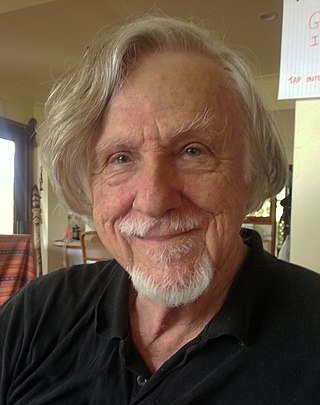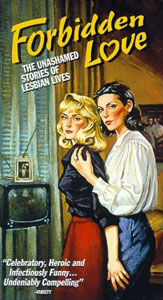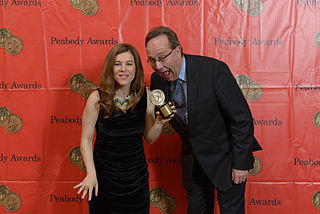Related Research Articles

The National Film Board of Canada is Canada's public film and digital media producer and distributor. An agency of the Government of Canada, the NFB produces and distributes documentary films, animation, web documentaries, and alternative dramas. In total, the NFB has produced over 13,000 productions since its inception, which have won over 5,000 awards. The NFB reports to the Parliament of Canada through the Minister of Canadian Heritage. It has bilingual production programs and branches in English and French, including multicultural-related documentaries.

Cinema in Canada dates back to the earliest known display of film in Saint-Laurent, Quebec, in 1896. The film industry in Canada has been dominated by the United States, which has utilized Canada as a shooting location and to bypass British film quota laws, throughout its history. Canadian filmmakers, English and French, have been active in the development of cinema in the United States.
Mark Achbar is a Canadian filmmaker, best known for The Corporation (2003), Manufacturing Consent: Noam Chomsky and the Media (1994), and as an Executive Producer on over a dozen feature documentaries.

Alanis Obomsawin, is an Abenaki American-Canadian filmmaker, singer, artist, and activist primarily known for her documentary films. Born in New Hampshire, United States and raised primarily in Quebec, Canada, she has written and directed many National Film Board of Canada documentaries on First Nations issues. Obomsawin is a member of Film Fatales independent women filmmakers.

I've Heard the Mermaids Singing is a 1987 Canadian comedy-drama film directed by Patricia Rozema and starring Sheila McCarthy, Paule Baillargeon, and Ann-Marie MacDonald. It was the first English-language Canadian feature film to win an award at the Cannes Film Festival.

The Outside Chance of Maximilian Glick is a 1988 Canadian film based on the novel by Morley Torgov. The film was shot in Winnipeg and Beausejour, Manitoba.
Cynthia Scott is a Canadian award-winning filmmaker who has produced, directed, written, and edited several films with the National Film Board of Canada (NFB). Her works have won the Oscar and Canadian Film Award. Scott is a member of the Royal Canadian Academy of Arts. Her projects with the NFB are mainly focused on documentary filmmaking. Some of Scott's most notable documentaries for the NFB feature dancing and the dance world including Flamenco at 5:15 (1983), which won an Academy Award for Best Documentary at the 56th Academy Awards in 1984. She is married to filmmaker John N. Smith.

Michael Dattilo Rubbo is an Australian documentarian/filmmaker.
Colin Archibald Low was a Canadian animation and documentary filmmaker with the National Film Board of Canada (NFB). He was known as a pioneer, one of Canada's most important filmmakers, and was regularly referred to as "the gentleman genius". His numerous honors include five BAFTA awards, eight Cannes Film Festival awards, and six Academy Award nominations.
Julia Kwan is a Canadian screenwriter, director, and occasional producer of her own short and feature films. She has brought a keen sense of the Chinese-Canadian cultural experience to her films. Several of the films were made in conjunction with the National Film Board of Canada Her feature films include Eve and the Fire Horse (2005), as well as the feature length documentary film Everything Will Be (2014). She is also known for her short film 10,000 Delusions (1999) which screened at the Vancouver International Film Festival.

Forbidden Love: The Unashamed Stories of Lesbian Lives is a 1992 Canadian hybrid drama-documentary film about Canadian lesbians navigating their sexuality while homosexuality was still criminalized. Interviews with lesbian elders are juxtaposed with a fictional story, shot in fifties melodrama style, of a small-town girl's first night with another woman. It also inserts covers of lesbian pulp fiction. The film presents the stories of lesbians whose desire for community led them on a search for the few public beer parlours or bars that would tolerate openly queer women in the 1950s and 60s in Canada. It was written and directed by Lynne Fernie and Aerlyn Weissman and featured author Ann Bannon. It premiered at the 1992 Toronto Festival of Festivals and was released in the United States on 4 August 1993. It was produced by Studio D, the women's studio of the National Film Board of Canada.
Kanehsatake: 270 Years of Resistance is a 1993 feature-length film documentary film by Alanis Obomsawin, highlighting the events of the 1990 Oka Crisis. Produced by the National Film Board of Canada, the film won 18 Canadian and international awards, including the Distinguished Documentary Achievement Award from the International Documentary Association and the CITY TV Award for Best Canadian Feature Film from the Toronto Festival of Festivals.
The Paper Wedding is a 1989 made for television Canadian film directed by Michel Brault. It was entered into the 40th Berlin International Film Festival.
Nettie Wild is a Canadian filmmaker with a focus on documentaries that highlight marginalized groups and discrimination that these groups face, including people in Canada and around the world. She has worked throughout her professional career as an actor, director, producer, and cameraperson.

Merit Motion Pictures is an independent documentary film and television production company based in Winnipeg, Manitoba, Canada. It was founded by Merit Jensen Carr in 1988.

Katerina Cizek is a Canadian documentary director and a pioneer in digital documentaries. She is the Artistic Director, Co-Founder and Executive Producer of the Co-Creation Studio at MIT Open Documentary Lab.
Wendy Tilby and Amanda Forbis are a Canadian animation duo. On January 24, 2012, they received their second Oscar nomination, for the National Film Board of Canada (NFB) animated short film, Wild Life (2011). With their latest film, The Flying Sailor, they received several nominations and awards, including for the Best Canadian Film at the Ottawa International Animation Festival, and on January 24, 2023, they received a nomination for the 95th Academy Awards under the category Best Animated Short Film.
John Spotton C.S.C. was a Canadian filmmaker with the National Film Board of Canada.
Mort Ransen was a Canadian film and television director, editor, screenwriter and producer, best known for his Genie Award-winning 1995 film Margaret's Museum.
Diplomatic Immunity is a Canadian political thriller film, released in 1991. It marked the narrative feature film debut of Sturla Gunnarsson.
References
- ↑ Posner 1993, p. 52-53.
- ↑ Posner 1993, p. 53.
- ↑ Posner 1993, p. 53-54.
- ↑ Posner 1993, p. 53-55.
- ↑ Posner 1993, p. 51.
- ↑ "Network offers on funding had strings, filmmaker says". Vancouver Sun . November 10, 1988. p. D18. Archived from the original on October 16, 2023 – via Newspapers.com.
- ↑ Posner 1993, p. 55-56.
- ↑ "Spy agency probed over film funding". Ottawa Citizen . June 30, 1990. p. C5. Archived from the original on October 16, 2023 – via Newspapers.com.
- ↑ Posner 1993, p. 56-57.
- ↑ Posner 1993, p. 67; 71.
- ↑ "Philippines politics: Behind the unrest". Oakland Tribune . May 10, 1990. p. C1. Archived from the original on October 16, 2023 – via Newspapers.com.
- ↑ Posner 1993, p. 57-62.
- ↑ "Lives On The Line: Filming documentary was risky - now comes fight for Canadian screenings". Vancouver Sun . May 5, 1989. p. D1. Archived from the original on October 16, 2023 – via Newspapers.com.
- ↑ Posner 1993, p. 63-65.
- 1 2 Posner 1993, p. 67.
- ↑ Posner 1993, p. 66.
- ↑ Posner 1993, p. 67-68.
- ↑ Posner 1993, p. 68.
- ↑ Posner 1993, p. 68-69.
- 1 2 Posner 1993, p. 69-70.
- ↑ Posner 1993, p. 51; 70; 74.
- ↑ "After 32 years, documentary on aftermath of Marcos rule gets PH premiere". ABS-CBN Corporation . September 18, 2020. Archived from the original on October 16, 2023.
- ↑ Posner 1993, p. 70-72; 75-77.
- ↑ Posner 1993, p. 72-73.
- 1 2 Posner 1993, p. 69.
- ↑ Variety 1991.
- ↑ "Local paper opposes film's 'leftist' leanings". Oakland Tribune . May 10, 1990. p. C1. Archived from the original on October 16, 2023 – via Newspapers.com.
- ↑ "Vision captured on film". Edmonton Journal . June 2, 1989. p. D6. Archived from the original on October 16, 2023 – via Newspapers.com.
- ↑ "MOVIE REVIEW: 'Leaves' Probes Philippine Revolution". Los Angeles Times . May 24, 1990. Archived from the original on October 16, 2023 – via Newspapers.com.